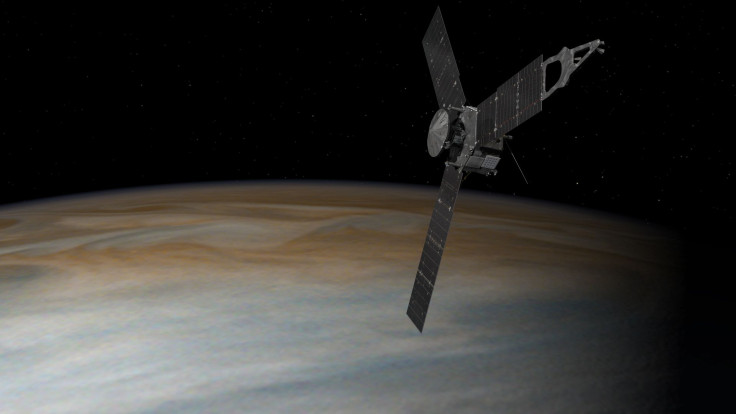NASA’s Juno Spacecraft Exits Safe Mode, Prepares For Next Close Flyby Of Jupiter

NASA’s Juno spacecraft, which unexpectedly entered into safe mode last week, has recovered and is now responding to commands, the space agency said in a mission update released Wednesday. The solar-powered spacecraft entered safe mode Oct. 18 when an as-of-yet unidentified software performance issue caused its onboard computer to reboot.
“Juno exited safe mode as expected, is healthy and is responding to all our commands,” Rick Nybakken, Juno project manager from NASA’s Jet Propulsion Laboratory in Pasadena, California, said in the statement. “We anticipate we will be turning on the instruments in early November to get ready for our December flyby.”
On Dec. 11, when Juno makes its closest approach to Jupiter, all its science instruments would stay on. In addition, JunoCam — the high-resolution camera on board the spacecraft — would also be switched on to capture close-up images of the gas giant.
“We are all excited and eagerly anticipating this next pass close to Jupiter,” Scott Bolton, principal investigator of Juno from the Southwest Research Institute in San Antonio, said in the statement. “The science collected so far has been truly amazing.”
During the previous close flyby, the spacecraft failed to collect any data because all its science instruments were turned off during the safe mode. A few days before that, NASA was also forced to postpone a maneuver that would have shortened the spacecraft’s orbital period from its current 53 days to 14 days. The decision was made after scientists at NASA discovered that a pair of check valves that regulate the flow of helium to Juno’s engines was malfunctioning. A NASA team is still assessing the condition of the valves in addition to determining the cause of the reboot.
This would just be the third of the three dozen flybys Juno is scheduled to perform over the next one-and-a-half years. At the end of its mission, Juno will dive into Jupiter’s atmosphere and burn up — a "deorbit" maneuver that is necessary to ensure that it does not crash into and contaminate the Jovian moons Europa, Ganymede and Callisto.
© Copyright IBTimes 2025. All rights reserved.






















